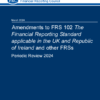
Incomplete Records & AML
In last week’s blog we looked at the fraud of Missing Trader and AML. This week the case study from the CCAB is about incomplete records.
Evans, Saffer Clarke LLP (ESC LLP) is a firm of Chartered Accountants based in a suburb of London. It acts for a number of local businesses and individuals. Its main services relate to accounts preparation, tax compliance (including VAT) and advice. It also acts as a trust and company service provider (TCSP).
ESC LLP acts for PMC Beauty Limited (“PMC”) which runs two hair and beauty salons locally. ESC LLP has carried out due diligence on PMC and has identified the beneficial owner (Martin Crean) who, until recently ran the business with his wife. ESC LLP has copies of his passport and utility bill.
Pamela, Mrs Crean, died recently and Martin has ceded day to day control to Victor, who came into the business as a temporary financial controller whilst Pamela (who previously kept the records) was ill.
During Pamela’s illness, Martin Crean asked Sandra Clarke (a partner in ESC LLP) to join the board as a non-executive director. Sandra agreed as a favour and because PMC is one of her largest clients but does not really have the time to devote to the role and so does not always attend meetings and is not as well informed about activities of the company as she would like.
Since Victor took over, ESC LLP have noticed that the records have not been kept as immaculately as in Pamela’s days. There seems to be confusion as to what has been bought or sold by which shop and there is cash being banked which doesn’t match the till records. Sandra raised her concerns with Victor, who became irritated, saying that “he wasn’t an accountant and that was why she was on the board. If she didn’t think she had enough information to draw up the accounts he would go to another firm.”
Sandra drew up the accounts and based on handwritten receipts provided by Victor and the new shop manager in one of the branches, recorded income from the shops corresponding to the bank deposits and as expenses, sundry payments to the cash and carry for supplies (based on credit card records).
The position remained the same over the next year. Three months after the account’s preparation was completed and the tax returns filed, Sandra received a visit from the police. They had been investigating PMC for money laundering and required access to Sandra’s records.
Sandra was interviewed under caution in respect of suspicions of false accounting and money laundering.
Questions
What were the red flags Sandra could have picked up?
- The first red flag was the fact that the underlying records did not match the information provided, particularly in relation to cash transactions. If the business had not changed substantially then there should have been no reason for the difference.
- There was a clear suggestion from Victor that if Sandra was unwilling to prepare the accounts then the business would be taken elsewhere. This indicated that Victor did not want the records to be examined in too much detail.
- Sandra should also have been suspicious that certain handwritten records were being provided by Victor and a new manager when previously this may not have been the case and queried why there had been a change in procedure.
What actions should have been taken?
- Sandra should have taken time to visit the premises and speak to both Victor and the new manager to establish the extent of their experience working in beauty salons. She should have tried to ascertain whether cash receipts had increased since Victor took over, and if so, why this was the case.
- Sandra should have arranged for the system of recording income to be balanced every day to reconcile with bank lodgement or credit card receipts. Despite the circumstances she could have discussed this with the previous owner to find out what information he had about Victor and his knowledge of beauty salons.
- As a Board member of PMC Ltd Sandra had the right to instruct the manner in which the records were kept. She should have been aware of her responsibilities in relation to maintaining financial records and the way the company carried out its business. As a Board member of PMC, Sandra would have been conflicted if an audit was required but could have prepared the financial statements. If an Accountant’s Report was required then this would need to have been carried out by another firm.
How should matters have been handled differently?
- Sandra should have been firmer with Victor, despite his suggestion that if she was difficult he would take the business elsewhere. She was a Board member and Victor as the Financial Controller had no authority to make decisions of this nature.
It can be assumed that Sandra would have had support from the other shareholder.
- Sandra could also have arranged for one of her employees to attend the salons on a regular basis to carry out spot checks. This would have sent a message to Victor that his work was being scrutinised from time to time.
- As a last resort she could have dismissed Victor and advertised for a new Financial Controller. It appears that she became too concerned about losing the client and allowed the situation to continue, which led to the subsequent police actions.
Next week we will look at a case study about the non-payment of tax and how that can give rise to criminal proceeds.
To ensure your letters of engagement and similar templates are up to date visit our site here where immediate downloads are available in Word format. A bulk discount is available for orders of five or more items if bought together.
For our latest Audit Quality Control Manual (October 2021) (implementing the latest Irish Audit & Accounting Supervisory Authority standards including ISQC1 on audit quality control) click here. View the Table of Contents here.
We also have an up to date Anti-Money Laundering Procedures Manual (September 2021) – View the Table of Contents click here.






